Related Research Articles
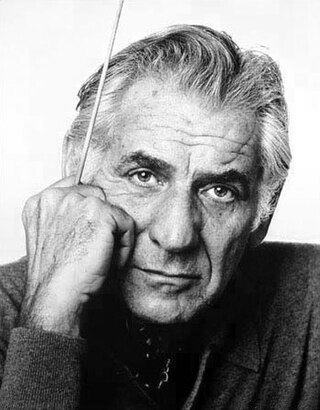
Leonard Bernstein was an American conductor, composer, pianist, music educator, author, and humanitarian. Considered to be one of the most important conductors of his time, he was the first American conductor to receive international acclaim. Bernstein was "one of the most prodigiously talented and successful musicians in American history" according to music critic Donal Henahan. Bernstein received numerous honors and accolades including seven Emmy Awards, two Tony Awards, and 16 Grammy Awards as well as an Academy Award nomination. He received the Kennedy Center Honor in 1981.
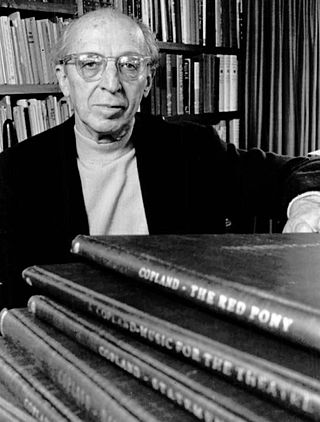
Aaron Copland was an American composer, composition teacher, writer, and later a conductor of his own and other American music. Copland was referred to by his peers and critics as the "Dean of American Composers". The open, slowly changing harmonies in much of his music are typical of what many people consider to be the sound of American music, evoking the vast American landscape and pioneer spirit. He is best known for the works he wrote in the 1930s and 1940s in a deliberately accessible style often referred to as "populist" and which the composer labeled his "vernacular" style. Works in this vein include the ballets Appalachian Spring, Billy the Kid and Rodeo, his Fanfare for the Common Man and Third Symphony. In addition to his ballets and orchestral works, he produced music in many other genres, including chamber music, vocal works, opera and film scores.
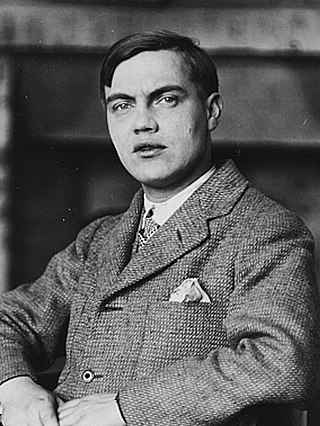
George Johann Carl Antheil was an American avant-garde composer, pianist, author, and inventor whose modernist musical compositions explored the sounds – musical, industrial, and mechanical – of the early 20th century. Spending much of the 1920s in Europe, Antheil returned to the United States in the 1930s, and thereafter composed music for films, and eventually, television. As a result of this work, his style became more tonal. A man of diverse interests and talents, Antheil was constantly reinventing himself. He wrote magazine articles, an autobiography, a mystery novel, and newspaper and music columns.
Harold Samuel Shapero was an American composer.

Serge Koussevitzky, born Sergey Aleksandrovich Kusevitsky was a Russian-born conductor, composer and double-bassist, known for his long tenure as music director of the Boston Symphony Orchestra from 1924 to 1949.
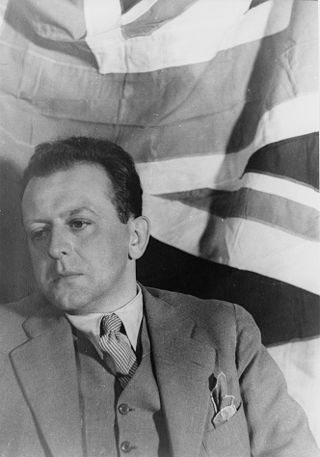
Colin Carhart McPhee was a Canadian-American composer and ethnomusicologist. He is best known for being the first Western composer to make a musicological study of Bali, and developing American gamelan along with fellow composer Lou Harrison. He wrote original music influenced by that of Bali and Java, decades before such compositions that were based on world music became widespread.

Appalachian Spring is a ballet created by the American composer Aaron Copland and the choreographer Martha Graham, later arranged as an orchestral work. Commissioned by Elizabeth Sprague Coolidge, Copland composed the ballet for Graham; the original choreography was by Graham, with costumes by Edythe Gilfond and sets by Isamu Noguchi. The music was well-received at the 1944 premiere, earning Copland the Pulitzer Prize for Music after the ballet's 1945 United States tour. The orchestral suite composed in 1945 was played that year by many symphony orchestras; the suite is among Copland's best-known works, and the ballet remains essential in the Martha Graham Dance Company repertoire.
Howard Pollack is a prominent American pianist and musicologist, known for his biographies of American composers.
Irving Gifford Fine was an American composer. Fine's work assimilated neoclassical, romantic, and serial elements. Composer Virgil Thomson described Fine's "unusual melodic grace" while Aaron Copland noted the "elegance, style, finish and...convincing continuity" of Fine's music.

Connotations is a classical music composition for symphony orchestra written by American composer Aaron Copland. Commissioned by Leonard Bernstein in 1962 to commemorate the opening of Philharmonic Hall in New York City, United States, this piece marks a departure from Copland's populist period, which began with El Salón México in 1936 and includes the works he is most famous for such as Appalachian Spring, Lincoln Portrait and Rodeo. It represents a return to a more dissonant style of composition in which Copland wrote from the end of his studies with French pedagogue Nadia Boulanger and return from Europe in 1924 until the Great Depression. It was also Copland's first dodecaphonic work for orchestra, a style he had disparaged until he heard the music of French composer Pierre Boulez and adapted the method for himself in his Piano Quartet of 1950. While the composer had produced other orchestral works contemporary to Connotations, it was his first purely symphonic work since his Third Symphony, written in 1947.
The Piano Variations of American composer Aaron Copland were written for piano solo from January to October 1930. They were dedicated to American writer and literary critic Gerald Sykes, and were originally published in 1932 by Cos Cob Press, which merged with Arrow Music Press in 1938 and was taken over by Boosey & Hawkes in 1956. The approximate performance time is 11 minutes.
The League of Composers/International Society for Contemporary Music is a society whose stated mission is "to produce the highest quality performances of new music, to champion American composers in the United States and abroad, and to introduce American audiences to the best new music from around the world." It was founded in New York City in 1923 by Claire Reis, Louis Gruenberg, Alma Wertheim, Lazare Saminsky, Leo Ornstein, Emerson Whithorne, Frederick Jacobi, Stephen Bourgeois, and Minna Lederman, when they seceded from the International Composers Guild. In 1954, the League of Composers became the US chapter of the International Society of Contemporary Music (ISCM) and has since been known as the League of Composers/ISCM.
The "Tonight Quintet" is a number from the musical West Side Story (1957), with music by Leonard Bernstein and lyrics by Stephen Sondheim. Carol J. Oja has written that, "with the 'Tonight' quintet, Bernstein once again created a masterpiece of ensemble, one that rivals the best of such moments in European opera." Her remark echoes the earlier view of Will Crutchfield. In his review of the 1984 studio performance of West Side Story, which was conducted by Bernstein himself, Crutchfield wrote that the release of the recording "is above all an occasion for celebrating one of the great operas of our century. ... This idea is hotly resisted, but the best argument for it is here on the records in the music itself. I can see no reason why the 'Tonight' ensemble should not be compared to the quartet from Rigoletto."
Theodore Ward Chanler was an American composer.
Minna Lederman Daniel was a music writer and editor of the magazine Modern Music for more than 20 years.

Piano Sonata No. 3 is a solo piano work written in 1928 by the Mexican composer Carlos Chávez.
Marion Wetherill Walton aka Marion Walton Putnam was an American sculptor and teacher born in New Rochelle, New York.
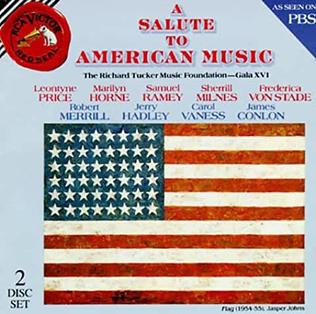
A Salute to American Music is a 113-minute live album of music, both classical and popular, performed by Steven Blier, Renée Fleming, Paul Groves, Jerry Hadley, Karen Holvik, Marilyn Horne, Jeff Mattsey, Robert Merrill, Sherrill Milnes, Maureen O'Flynn, Phyllis Pancella, Leontyne Price, Samuel Ramey, Daniel Smith, Frederica von Stade, Tatiana Troyanos, Carol Vaness and Denise Woods with the Collegiate Chorale and members of the Metropolitan Opera Orchestra under the direction of James Conlon. The album was released in 1992.
Wolfgang Rathert is a German musicologist born in Minden.
Renée Longy-Miquelle (1898–1979) was a French-American pianist, music theorist, and noted pedagogue who served as a faculty member of the Juilliard School, the Curtis Institute of Music, and the Peabody Conservatory. She was the teacher of many seminal students, including Leonard Bernstein.
References
- 1 2 "Carol J.Oja".
- ↑ "Symposia to explore life, music of conductor Leonard Bernstein". Harvard Gazette. 2006-10-05. Retrieved 2020-03-12.
- 1 2 Ratliff, Ben (December 9, 2000). "Mark Tucker, 46, Jazz Scholar and Musician". The New York Times .
- 1 2 3 "Mark Tucker Award". Society for American Music .
- ↑ Oja, Carol. (2011). "Making Musicology Modern: An Interview withCarol Oja." By Tom Riis. American Music Research Center Journal 20:54-68 at Digital Access to Scholarship at Harvard (DASH) website.
- ↑ Floyd, Samuel A. Jr. (1 October 2008) [2009–2010]. "Ruminations on the Center for Black Music Research". College Music Symposium. College Music Society (published 1 October 2018). 49/50: 9–17. JSTOR 41225225.
- ↑ "3 graduate students file sexual harassment suit against prominent Harvard anthropology professor". The Boston Globe . Retrieved 2022-02-08.
- ↑ Oja, Carol J. (2014). Bernstein Meets Broadway: Collaborative Art in a Time of War. New York: Oxford University Press. ISBN 9780199862092.
- ↑ Meyer, Felix; Oja, Carol J.; Rathert, Wolfgang; Shreffler, Anne C., eds. (2014). Crosscurrents: American and European Music in Interaction, 1900-2000. Woodbridge, Suffolk, UK: The Boydell Press. ISBN 9781843839002.
- ↑ Oja, Carol J.; Tick, Judith, eds. (2005). Aaron Copland and His World. Princeton, NJ: Princeton University Press. ISBN 9780691124704.
- ↑ Oja, Carol J. (2000). Making Music Modern: New York in the 1920s. New York: Oxford University Press. ISBN 9780195162578.
- ↑ Oja, Carol J. (2004). Colin McPhee: Composer in Two Worlds (2nd ed.). Urbana and Chicago: University of Illinois Press. ISBN 9780252071805.
- ↑ Crawford, Richard; Lott, R. Allen; Oja, Carol J., eds. (1990). A Celebration of American Music: Words and Music in Honor of H. Wiley Hitchcock. Ann Arbor: University of Michigan Press. ISBN 9780472094004.
- ↑ Oja, Carol J., ed. (1982). American Music Recordings: A Discography of 20th-Century U.S. Composers. Brooklyn, NY: Institute for Studies in American Music and Koussevitzky Music Foundation. ISBN 9780914678199.
- ↑ Oja, Carol J., ed. (1982). Stravinsky in "Modern Music" (1924–1946). New York: Da Capo Press. ISBN 9780306761089.